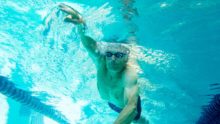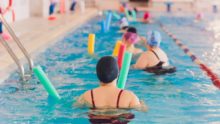
When to eat to maximise your workout
28/06/2016Improving your figure or losing a little weight doesn’t necessarily mean eating less food. There are times of the day when you can eat to maximise your workout.
Yes, a good basic diet is important. As is avoiding bad fats and ensuring we eat the right carbohydrates. But something often missed by people is that there are good and bad times to eat to maximise your workout effectiveness.
7 tips on when to eat to maximise your workout
- Workout before breakfast. Your body starts to use your fat stores for energy when you don’t have any available carbs in your system. Maximum fat loss occurs during workouts performed before breakfast. This is when your body hasn’t had any recent carbs intake to use for energy. At this time your fat stores will be the only option.
- No eating 2 hours before working out. If you have no time to swim or workout in the morning, try to develop a habit of not eating for two hours before you get in the pool. This way your body burns off the remaining carbs while releasing free fatty acids. Your body will still use a portion of your fat stores for energy rather than energy from food you may have eaten before.
- Make your meal big on protein. If you’re working out during the day, try to eat a meal of about 350-400 calories two to three hours before training. Protein-rich foods are best, along with more fibrous forms of carbohydrate, such as fresh green vegetables or salad items. A good example of this meal might be 100g of chicken or fish with cauliflower and broccoli or a green salad.
- Take up snacking. Elite athletes keep their blood sugar level as constant as possible by snacking regularly (and healthily) during the day. Only do this if you cut down the size of your main meals. It’s not an excuse to eat more during the day and then continue to eat large high calorie meals in one sitting.
- Refuel after a workout. Always refuel within 15-30 minutes of training. Your body needs the nutrients to repair muscles and energy. Make sure you’re refuelling with the ‘right’ foods though. Something low in fat but high in carbs and protein, such as a protein shake with a banana blended in.
- Fight evening snacking. Don’t overeat in the evening! Try to steer clear of any starchy and simple carbohydrates after 7pm. Bad evening snacking will not only create a greater capacity for fat storage, it could also affect your sleep patterns and leave you feeling sluggish and uncomfortable the next morning.
- I can’t, I LOVE an evening snack. OK, if you can’t live without an evening snack, opt for something high in protein like a glass of milk or a small protein shake where the absorption rate is slower and will be synthesised while you sleep.
 Just Swim
Just Swim



